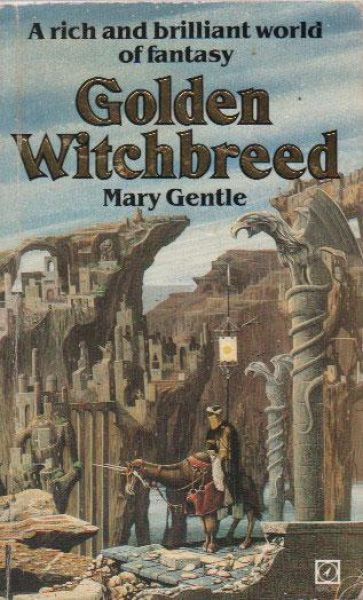Golden Witchbreed
Golden Witchbreed
By Mary Gentle

2 Sep, 2014
0 comments
The Earth of the near-future has faster-than-light travel of a particularly powerful sort; the entire Milky Way is just 90 days from Earth. Habitable worlds are common enough1 and much to the Dominion of Earth ‘s surprise generally inhabited. How to adapt when there are millions of alien civilizations on the Dominion’s doorstep?
Lynne de Lisle Christie comes from a junior branch of a British family prominent in the diplomatic arts and while Lynne would prefer not to rely on her blood connections to find a position, the alternative – genteel poverty in a world in which Britain has languished back into peripheral status – is even less acceptable. Trading on her relative’s guilt over how Lynne has been treated, the naïve Briton obtains a position in the Dominion’s diplomatic services.
When we meet Lynne she has been sent to the distant world Orthe in a position more senior than her experience justifies; this underlines how short-staffed the Dominion is as it attempts to assimilate the galaxy at once. In the Dominion’s eyes, sending a junior like Lynne is making the best of a bad situation: if she gets herself killed as the previous ambassador did, no great loss to the Dominion and it seems unlikely one human can do much damage to Orthe.
Lynne quickly discovers that the Dominion has completely misread the situation on Orthe. She is prepared for a backward world like Earth of a few centuries ago. Orthe is actually a post-technological world whose inhabitants deliberately turned their back on advanced technology following the holocaust that cast down Orthe’s former rulers, the Witchbreed. There is every chance some remnant of Orthe’s former glory could present a danger to Earth, a fair one that the Dominion may destabilize Orthe and an absolute certainty that Lynne will become the focus of plots as soon as she sets foot on the planet.
Should I have mentioned that Lynn is forced to go on the run at one point? It seems to me inevitable that in books of this sort, the protagonist will be forced to tour the alien world, either willingly or unwillingly, so the author can show off their world-building. This goes double if there is a map. There is a map.
This is part of the same lineage of fiction as the Norton I read last week, as well as being related to works like The Left Hand of Darkness, SF set in universes with long histories Earth has little inkling of. Lynne can be forgiven for being so ill-prepared, unlike some supposed diplomats I could mention Bren Cameron, but how is it nobody on Earth seems to have asked “if there are hundreds of thousands of inhabited worlds and many of them are within centuries of our level of technological sophistication, what are the odds we are the most advanced?” And of course Earth isn’t the most advanced world, although I don’t know that it will ever occur to Lynne to mention the coreward civilization she learns about at one point.
I know I said last week that “for my money if you want incredibly depressing visions of the future, you cannot beat Anglospheric SF of the 1970s.” Although Golden Witchbreed is from 1983, it definitely is a competitor in the highly competitive field of moroseness: the Earth itself seems to be doing all right for the moment2 but at least one character expects disaster and the implication (at least to me) of the ease of FTL and what we see of Orthe is that advanced worlds generally don’t stay that way for long.
This is well written, although oddly archaic in spots, but I found it a bit hard to sympathize with anyone in Golden Witchbreed: the Ortheians love of intrigue seems like it would get tedious very quickly and Lynne herself is an example of the hazards of nepotism. The Dominion is making decisions of dubious merit and I don’t see any of this ending well.
Golden Witchbreed may be purchased here.
1: There is an unfortunate howler early on.
“Maybe a hundred million stars in this galaxy. Maybe a hundred thousand planets capable of supporting life we’d recognize as life.”
That should be a hundred billion stars and if the number of habitable worlds scales, a hundred million planets capable of supporting life we’d recognize as life.
2: The West has declined but not because it glassed itself; the world economy has converged and since most of humanity lives in Asia… But Lynne is from Britain and so her perspective is that of a person from a backwater whose days of greatness ended recently enough her great-grandparents probably experienced them.
British diplomats appear to be in demand but while they appear to think very well of themselves I suspect they are being put to use in the field less because the Dominion thinks insular communities of smug Oxbridge-educated ex-pats are the key to subduing the galaxy and more because nobody in Beijing or New Delhi is going to mind too much if the odd group of Brits ends up with their heads on spikes.
